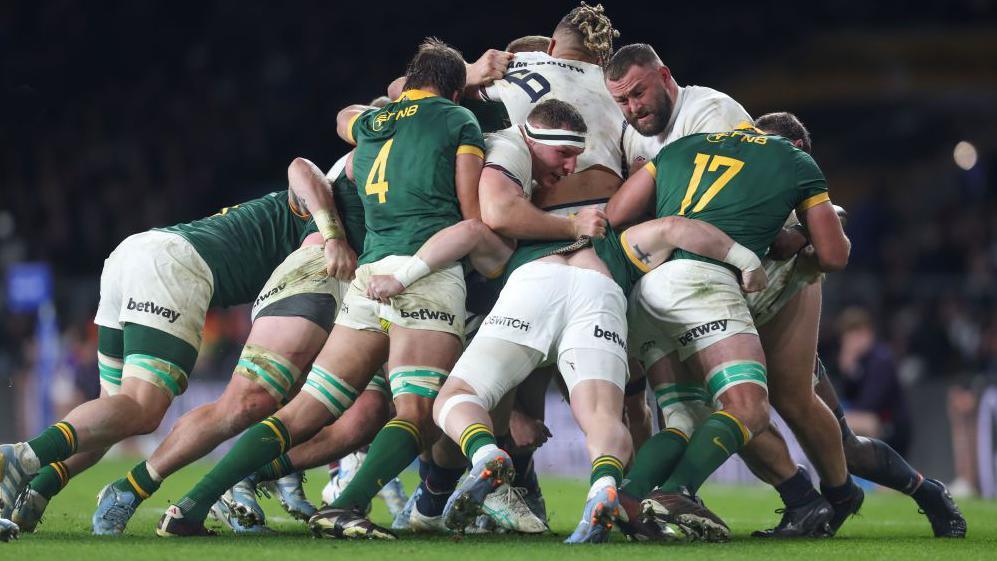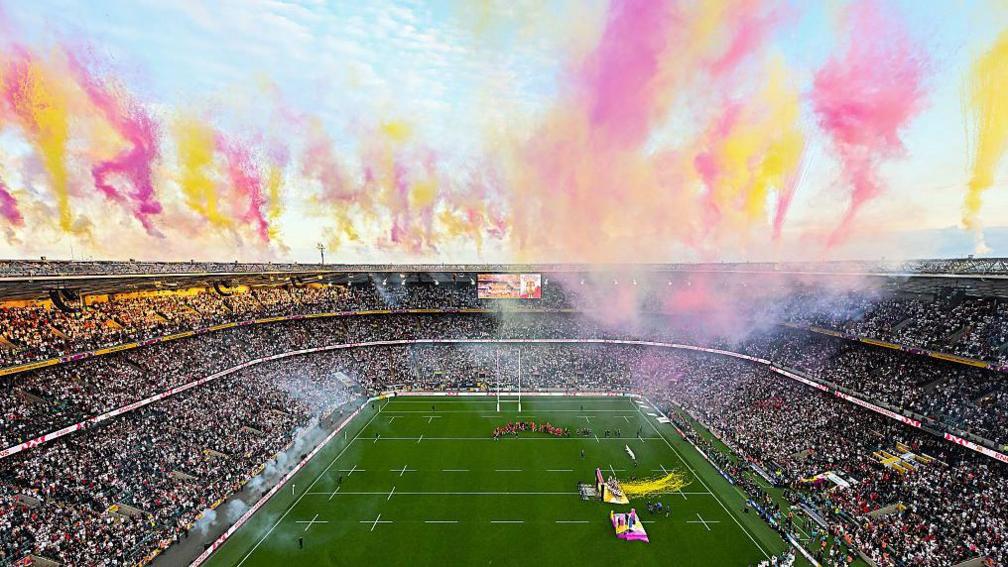Nations Championship to have north v south finale

England and South Africa are currently the highest-ranked northern and southern hemisphere teams respectively
- Published
The Twickenham finale of next year's new Nations Championship event will pit the north and south of global rugby against each other in a contest to be the game's dominant hemisphere.
The biennial 12-team event comprises six rounds of matches across the summer and autumn Test windows before three double-header fixture days on 27-29 November at Allianz Stadium to rank nations and crown champions.
The results from the 'finals weekend' will also contribute to a parallel contest, to decide which hemisphere prevails overall.
The Six Nations teams will be the northern hemisphere representatives, with South Africa, New Zealand, Australia, Argentina, Fiji and Japan as their opposition.
Southern hemisphere teams have won nine of the 10 men's Rugby World Cups, with England's victory in 2003 a solitary success for the north. However, the world rankings are split more evenly - with five teams from each hemisphere in the top 10.
The first round of Nations Championship matches, on Saturday, 4 July, includes a clutch of headline fixtures - with South Africa hosting England, France travelling to New Zealand and Australia facing Ireland.
Fiji are set to play their home matches at neutral grounds, given the logistical difficulties of travel to the Pacific Islands and the ability to maximise revenue at larger grounds elsewhere.
England's match against Fiji, in the second round of fixtures, will be played in South Africa, giving Steve Borthwick's side an extended stay in the country before they fly on to face Argentina.
Fiji's matches against Wales and Scotland in rounds one and three are expected to be played in the United Kingdom.
'It will take Test rugby to new heights'

Ireland and Australia are opponents on the opening weekend of the new competition
Organisers, who will now start the search for broadcasters and sponsors, believe a clearer structure - a narrative that builds towards a finals weekend and a centralised revenue-sharing model - will generate tens of millions more pounds for the teams taking part.
"Rugby's strongest nations have collaborated with a clear vision to grow the game, by challenging traditional ways of operating to create a tournament structure with genuine global relevance, which will unlock the true value of the sport," said Six Nations chief executive Tom Harrison, hailing the Nations Championship as a "tectonic shift" in the sport.
"The world's biggest and best championships are defined by intense sporting drama, and the Nations Championship will stand alongside these.
"The Finals Weekend will add a totally new dimension for fans, and promises to create an incredible spectacle, crown champions, and act as a catalyst to grow rugby's reach, globally.
"By bringing together the best teams and players in the sport and injecting another layer to the fierce cross-hemisphere rivalries, the Nations Championship will take international rugby to new heights."
The event will be held in every year that does not feature a men's Rugby World Cup or a British and Irish Lions tour.
London's lure wins out in race to host climax of opening event

Allianz Stadium also hosted the Women's Rugby World Cup final in September
The 82,000-capacity Allianz Stadium can draw on London's large southern-hemisphere population for the finals of the inaugural edition.
More than 80,000 watched a Rugby World Cup warm-up match between South Africa and New Zealand there in August 2023.
However, there is an ambition to take future finals to new destinations.
It has been speculated that a host in the Middle East in 2028, and in the United States in 2030, would strike a balance between maximising revenues and spreading the game into new markets.
The Nations Championship will "democratise" the calendar for those taking part, with lower-profile nations guaranteed matches against the game's biggest draws.
The new event, which is part of a more closely aligned global calendar signed off by World Rugby in 2023, will however limit opportunities for traditional tours - on which visiting teams play multiple Tests against their hosts - and standalone autumn internationals.
South Africa and New Zealand have bucked that trend by announcing they will embark on multi-match trips to each other on a four-yearly basis.
The establishment of the Nations Championship, along with a Club World Cup that will be staged for the first time in 2028, have come amid an increasingly competitive battle for rugby's top stars.
Start-up competition R360, fronted by ex-England centre Mike Tindall and backed by private investment, aims to launch in October 2026 with eight men's franchise teams and a globetrotting itinerary.
England, New Zealand, Ireland, France, Scotland, Australia, South Africa and Italy issued a blanket ban on selecting any R360 recruits for their national teams in October.
2026 Nations Championship fixtures
4 July
New Zealand v France
Japan v Italy
South Africa v England
Australia v Ireland
Fiji v Wales
Argentina v Scotland
11 July
New Zealand v Italy
Japan v Ireland
South Africa v Scotland
Australia v France
Fiji v England
Argentina v Wales
18 July
Japan v France
Australia v Italy
South Africa v Wales
New Zealand v Ireland
Fiji v Scotland
Argentina v England
6-8 November
Ireland v Argentina
Scotland v New Zealand
France v Fiji
Italy v South Africa
Wales v Japan
England v Australia
13-15 November
France v South Africa
Wales v New Zealand
Ireland v Fiji
Italy v Argentina
England v Japan
Scotland v Australia
21 November
England v New Zealand
Ireland v South Africa
France v Argentina
Scotland v Japan
Italy v Fiji
Wales v Australia
Finals Weekend
27 November
Sixth-place North v Sixth-place South
Third-place North v Third-place South
28 November
Fifth-place North v Fifth-place South
Second-place North v Second-place South
29 November
Fourth-place North v Fourth-place South
First-place North v First-place South
How it works
There are two blocks of trans-equatorial fixtures, with three played in July in the southern hemisphere and another three played in November in the north.
After each team has played the other six from the opposing hemisphere once, they are ranked within their own hemisphere.
The finals weekend in London will start with the sixth-placed northern hemisphere side taking on their southern hemisphere equivalent, and culminate in the two group winners taking each other on for the title.
The results on the finals weekend will also contribute to a north v south overall score and title.
World Rugby will be launching a "second division" version of the tournament and, while there is no prospect of relegation or promotion between the two, it is hoped up-and-coming nations such as Georgia, Spain and Uruguay, ranked 11th, 14th and 15th respectively, and the likes of Samoa, Tonga and the United States will benefit from games against top-tier nations on years when the Nations Championship is not being staged.